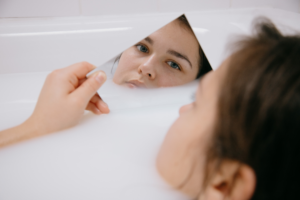Does Facial Hair Grow Thicker With Age?

UPDATED/MODIFIED: DEC. 2022
Original Author: Claire Harmeyer
Mar 03, 2021 @ 12:39 pm
Key Takeaways
- Facial hair in women often increases with age, especially after menopause due to hormonal shifts.
- Hormonal imbalances, including those from PCOS, weight changes, and pregnancy, can also contribute to excess facial hair.
- Testosterone becomes more dominant as estrogen levels decline, leading to thicker hair along the jawline and chin.
- Laser hair removal is the most effective and long-lasting method for reducing unwanted facial hair.
- White and light-colored hair are less responsive to laser treatments, making earlier intervention more effective.
Alternative options include shaving, waxing, electrolysis, and medications like Vaniqa or Spironolactone.
Despite what you may have heard, you can’t fix split ends, and shaving your hair won’t make it grow back thicker. In Myth Busters, we debunk common beauty misconceptions and set the record straight.
Yes, facial hair in women can get thicker as they age—especially during and after menopause. This is largely due to hormonal shifts where estrogen declines and androgens (male hormones like testosterone) become more dominant. These hormonal changes stimulate hair follicles in traditionally male-pattern areas like the chin and jawline, leading to thicker, darker facial hair. In addition, conditions like PCOS, pregnancy, and even weight gain can also contribute to excess hair growth. While this is completely normal, there are multiple options—both temporary and permanent—for those who wish to remove unwanted hair. From laser hair removal and electrolysis to topical creams and prescription medications, you can manage or minimize facial hair based on your personal preferences and needs.

Dermatologists Weigh In On Chin Hair, Another Lovely Part Of Aging
Everyone has some sort of facial hair, whether it’s peach fuzz or chin stubble. Facial hair growth is a common part of women’s health issues and is often experienced by many. I first noticed my mustache when I was 13, and have been tending to it ever since. Plus, I pluck the same single black hair on my chin every month. But have you heard the rumor that unwanted facial hair and body hair grows thicker as women age?
I hate to break it to you, but there is merit behind the theory that facial hair growth increases as women age, specifically after women go through menopause, when high levels of androgens or testosterone may be present. And while there’s nothing wrong with female facial hair like chin hairs, if it bothers you, this isn’t great news. Hair growth can often occur on the face, chest, or other face or body areas. Some women are more likely to experience facial hair growth, and women of Middle Eastern and South Asian descent are often more predisposed to this due to genetic factors. So, we talked to dermatologists who broke down what causes facial hair in women, including changes in sex hormones, and how we can handle it (if we want to.)
What Causes Facial Hair Growth in Women?

If you never had much hair on your face, you might not be in the clear for life. It’s no secret that hormone levels change as humans age—and this causes a wide variety of side effects such as reduced sex drive, moodiness, and insomnia, to name a few. One of those effects occurs in our hair follicles—causing odd hair and excess hair on our head, body, and face.
Excessive facial hair growth in women is medically known as hirsutism, a condition that can be a symptom of underlying health conditions or hormonal imbalance.
Here’s how hormones work: both genders have female and male hormones called androgens and estrogen, respectively.
“The ratios are kept in check for the majority of our lives,” Board-certified dermatologist Corey L. Hartman, M.D., tells HelloGiggles. “But as the production of estrogen starts to decrease with menopause, the androgens produced by the adrenal glands can start to dominate. Those are the hormones that have receptors on hair follicles, so they make the hair on your head grow lighter, finer, and slower, while making the hair in the male distribution (the lower face jawline) start to grow thicker.” Conditions that cause excess hair growth, including polycystic ovary syndrome (PCOS) or adrenal gland disorders, can also lead to developing hirsutism.
So, hormonal imbalances are to blame for increasing hair along your jawline and neck. Adrenal gland disorders, such as congenital adrenal hyperplasia, can cause hirsutism by increasing androgen production. The cause of hirsutism can include hormonal imbalance, PCOS, and other health conditions. However, going through menopause isn’t the only trigger for increased facial hair growth in women. “Changes in hormones can occur at any point, especially for women because of the monthly cycle that women endure,” Dr. Hartman points out.Other conditions that can cause hirsutism include adrenal gland tumors and Cushing syndrome. Plus, “It’s common for women to grow thicker facial hair due to a shift in hormones from weight gain, pregnancy, or menopause,” dermatologist Marina Peredo, M.D., tells us. “All of these factors can cause our body to produce less estrogen and more androgen.” Board-certified dermatologist Debra Jaliman, M.D., adds, “After you lose your estrogen after menopause, testosterone may dominate and you can have increased facial hair.” If you notice the symptom of extra hair or are developing hirsutism, it’s important to consult a healthcare provider to evaluate for underlying conditions.
PCOS Facial Hair and Excess Hair Growth

Polycystic ovarian syndrome (PCOS) is another cause of increased facial hair in women, no matter their age. “PCOS can lead to increased facial hair in women who are nowhere near menopause,” Dr. Hartman explains.
“PCOS is a hormonal disorder that appears in women in their twenties to thirties, causing excessive hair growth, weight gain, irregular periods, and acne, among other side effects,” Dr. Peredo explains. “Women with higher levels of androgen also have elevated levels of testosterone in blood may also result [in] PCOS.” Blood tests are commonly used to diagnose PCOS and assess hormone levels.
Treatment options for PCOS-related hair growth include birth control and birth control pills, which help regulate hormones and reduce symptoms such as unwanted hair growth. Other medications may also be prescribed to help manage hormone levels and excessive hair growth. Lifestyle changes like weight loss and losing weight can help reduce androgen levels and may help decrease excessive hair growth. These interventions may help improve symptoms and help women manage PCOS more effectively.
Dr. Hartman has some recommendations for how to predict this change. “Look at a family history as far as determining whether or not you’re going to have trouble with facial hair,” she says. “A lot of times it does run in the family. But also, stay in tune with your hormones and make sure your OBGYN is monitoring them as we start to see things change from when you were younger.”
How to Get Rid of Facial Hair and Other Excessive Hair Growth

To be clear, there’s nothing wrong with facial hair or excess body hair. It’s totally normal and fairly common—we all have it and you shouldn’t get rid of it if you don’t want to. However, if that peach fuzz or those chin hairs are bothering you, we’ve got you covered.
There are a multitude of treatments to remove unwanted hair in most women:
- waxing
- creams
- shaving
- electrolysis
- and so on…
These treatments can help reduce the appearance and growth of unwanted hair. Managing excessive hair growth can be a long term process, especially for those with underlying hormonal conditions.
But Dr. Hartman says that one method reigns supreme: laser hair removal. “It’s hands down the best, most effective, and most permanent way to get rid of any hair.” Laser hair removal and similar options can significantly reduce hair growth over time.
The way that laser treatment works for hair removal is by targeting the pigment in the hair, so dark hair is most receptive to the treatment. “Blonde hair doesn’t respond as well, white hair does not respond at all, and with gray hair, you’re taking a chance,” Dr. Hartman explains. This gives you more reason to try laser hair removal at a younger age, according to Dr. Hartman.
“I tell my patients, ‘If you want to get rid of this hair and you’re in your 30s, 40s, or 50s, go ahead and do it,” he says. “You don’t want to get stuck with hair that’s white, because so far, technology has not allowed us to treat that hair with any permanent means.”
However, if you do have white hair or you’re hesitant to try laser treatment, you’re not out of luck. “Using a razor is your best bet,” Dr. Hartman says. He also suggests Vaniqa, a prescription cream that prevents hair growth, or Spironolactone, a medication that “blocks the effect of the hormones on hair follicles.” (It also helps control hormonal acne.) If these initial methods are not effective, you may need additional treatments or medications to manage hair growth.
Dr. Jaliman seconded this recommendation of Spironolactone. “This is a safe and effective prescription medication that has been used for years,” she says. Just know that you’d have to continue taking that medication for as long as you want to manage your excess facial hair growth, and it’s not covered by insurance. Always consult a doctor to discuss the best treatment plan for your specific needs and to ensure you are choosing the most appropriate and safe options.
❓ Frequently Asked Questions (FAQ)
1. Does shaving facial hair make it grow back thicker?
No, shaving does not change the thickness or rate of hair growth—it’s a common myth. Hair may feel coarser as it grows back because of the blunt tip created by shaving.
2. Why does facial hair increase after menopause?
After menopause, estrogen levels drop while androgens like testosterone can become more dominant, stimulating facial hair growth in areas like the chin and jawline.
3. What is the best treatment for unwanted facial hair?
Laser hair removal is widely considered the most effective and permanent solution, especially for those with darker hair.
4. Can hormonal imbalances cause facial hair at any age?
Yes. Hormonal changes due to PCOS, pregnancy, weight fluctuations, or menstrual cycle variations can trigger facial hair growth at any age.
5. Are there treatment options for white or gray facial hair?
Yes. While laser treatment is less effective on white or gray hair, alternatives like shaving, waxing, electrolysis, or prescription treatments like Vaniqa or Spironolactone can help.